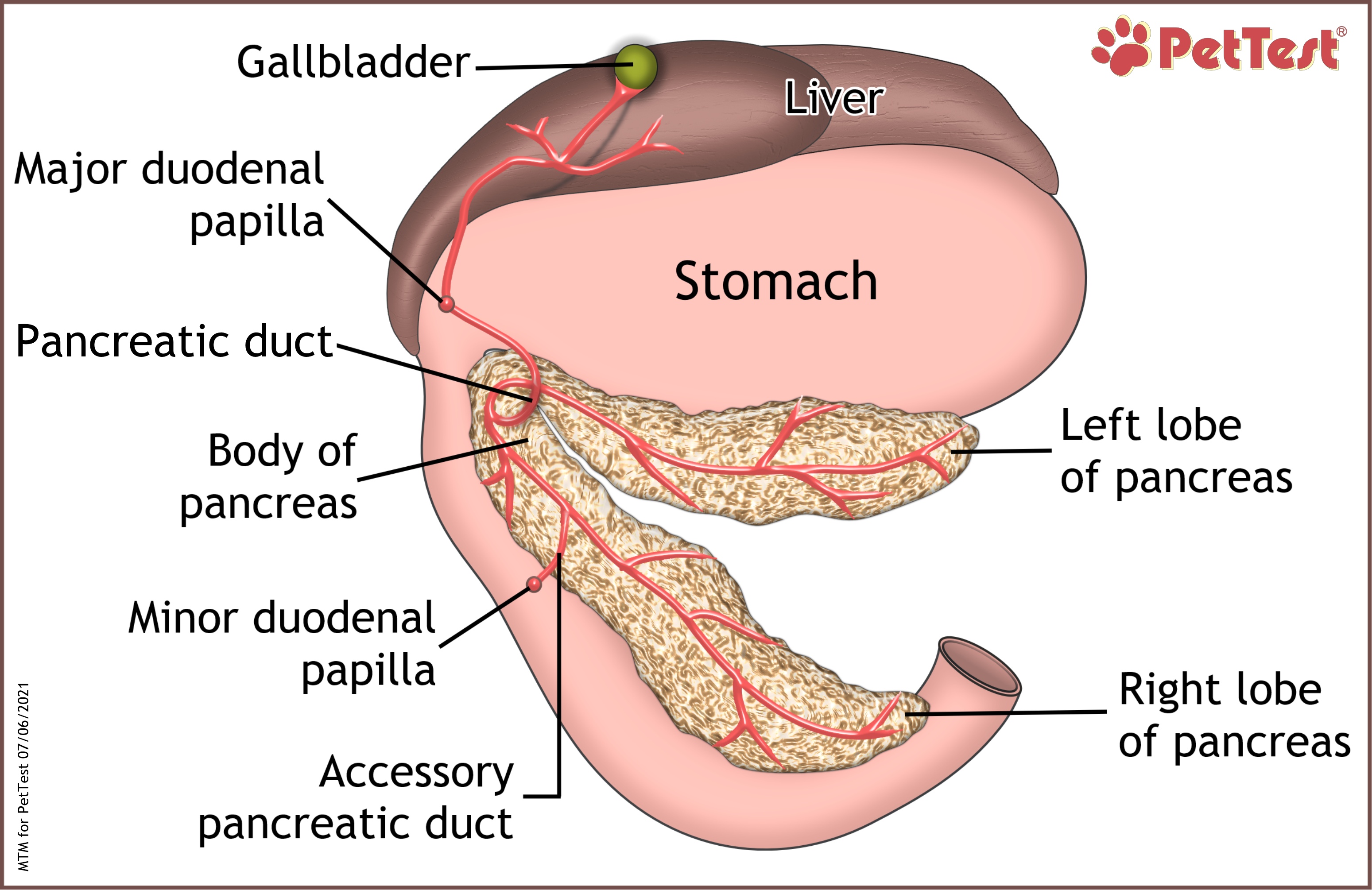The Canine Pancreas: Its Function
When Lucy was diagnosed with pancreatitis and diabetes I had no clue that dogs got either disease, and I certainly had no knowledge of them when it came to dogs. Once I was able to wrap my head around the basics; low-fat food, insulin schedule and running curves, I decided I needed to learn more about diabetes so that Lucy would have the healthiest life possible. Down the rabbit hole I went and while I have learned a lot about canine diabetes I am still learning! There is so much to learn about the pancreas, especially since for many of us, our diabetic dogs have had pancreatitis as well. So let’s talk about pancreas, grab a cup of your favorite caffeinated beverage and let’s get to it!

The pancreas is an organ that is part of the endocrine and digestive system. The pancreas has two main functions:
Exocrine Function: Produces and releases enzymes into a pancreatic duct that empties into the small intestine to aid in digestion. These digestive enzymes are amylase, lipase and protease.
- Amylase – Enzyme that breaks down carbohydrates (starches and glycogen) into simple sugars.
- Lipase – Enzymes that break down fats into fatty acids.
- Protease – Enzyme that breaks down protein into smaller polypeptides or single amino acids.
Endocrine Function: Produces and secretes hormones directly into the blood stream. The pancreas produces insulin, glucagon, somatostatin and pancreatic polypeptide.
- Glucagon – Produced by alpha cells in the Islets of Langerhans. Glucagon helps break down starches and glycogen into glucose by the liver.
- Insulin – Produced by beta cells in the Islets of Langerhans. Insulin helps glucose enter cells to be used as energy.
- Somatostatin – Produced by the delta cells of the Islets of Langerhans. This hormone inhibits the secretion of glucagon and insulin, growth hormones and thyroid stimulating hormones.
- Pancreatic polypeptide – Produced by the F (or PP) cells in the Islets of Langerhans. This hormone inhibits secretion of pancreatic fluid, bicarbonate and digestive enzymes. It also stimulates gastric acid secretion.

When the pancreas is healthy it functions just the way it should, food is digested properly and insulin is made to help glucose get to where it needs to go to feed the body. Since we have diabetic dogs we know that the pancreas is no longer functioning properly, pancreatitis diagnosis has led us to low-fat diets for our dogs. Let’s go over a couple of pancreatic diseases that are common.
Diabetes mellitus (DM) – An autoimmune disease that is caused by antibodies destroying the beta cells of the pancreas. When the beta cells are destroyed and can no longer produce enough or any insulin, this is considered type 1 (T1) diabetes.
The body produces antibodies to fight off viruses, these antibodies do not recognize the beta cells and attack and destroy them. Steroid medication, cancer, pancreatitis, heat cycles in female dogs and genetic predisposition can cause diabetes.
Symptoms of diabetes:
- Weight loss
- Ravenous appetite
- Increased thirst
- Increased urination (accidents)
- Lethargy
- Poor unkempt coat
- Decreased appetite
- Chronic infections like urinary tract infections
- Clouding of eyes (diabetic cataracts)
Treatment for diabetes is insulin therapy and lower carbohydrate diet. Insulin is given every 12 hours by injection just under the skin. A low carbohydrate diet helps reduce the amount of glucose that the body produces. Since dogs are considered T1 diabetics, insulin therapy is required for life. Animals cannot live without insulin.
Pancreatitis – Inflammation of the pancreas due to the digestive enzymes activating in the pancreas. These activated enzymes digest the pancreas. Genetically predisposed breeds, medications like steroids, gallbladder sludge, gallstones, obesity, trauma, cancer, hyperlipidemia and high fat diet can cause pancreatitis. Idiopathic pancreatitis is also possible, with no known explanation.
Symptoms of pancreatitis:
- Lack of appetite
- Lethargy
- Vomiting
- Diarrhea
- Hunched (praying position)
- Abdominal pain (tender to the touch)
- Dehydration
- Restless / agitation
- Unable to stand (acute pancreatitis)
- Shock (acute pancreatitis)
Treatment for pancreatitis is low fat diet; under 10% fat on a dry matter basis, anti nausea medication, antibiotics, pain medications, acid reducers and anti diarrhea medications. Several meals throughout the day may be advised to help reduce strain on the pancreas.
Exocrine Pancreatic Insufficiency (EPI) – The pancreas does not secrete digestive enzymes to the small intestine. Since digestive enzymes break down starches, glycogen, fats and proteins, a dog with EPI has poor absorption of nutrients. Genetics, pancreatic infection, pancreatitis, trauma can cause EPI. German Shepherds, Cavalier King Charles Spaniels, Chow Chows and Rough Coated Collied are genetically predisposed to EPI.
Symptoms of EPI are:
- Diarrhea
- Soft, greasy stools
- Light stools
- Increased appetite
- Weight loss
- Occasional vomiting
Treatment for EPI consists of feeding an easily digestible, low-fat food. Pancreatic enzyme replacement supplements, possible B12 supplement for B12 deficiency. Some dogs with EPI can have elevated folate levels, this indicates bacteria overgrowth in the small intestine and antibiotics are given to help this.
I hope that the information in this blog has been educational and informative, and you have a better understanding of how the pancreas works…it is a work horse!
If you have any questions, comments or suggestions, please start a conversation below.
Until next week, stay cool and caffeinated!
If you are looking for a Facebook community to join for support, I have been an admin in Diabetic Dog Owners for four and a half years. You can also join Canine Diabetes Support and Information on Facebook as well.
Be sure to join the PetTest family on Facebook and Instagram. PetTest has fun, interactive posts AND they have fabulous giveaways every week!
Click here to take you to a printable PDF.

